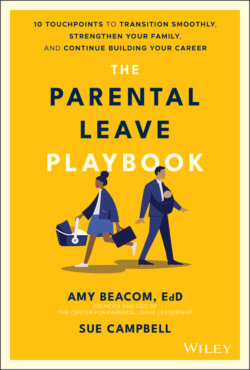Читать книгу The Parental Leave Playbook - Sue Campbell - Страница 38
Roles and Identity
ОглавлениеOne client, Kenny, grew up in a traditional home in a rural part of the country. His dad worked a lot and was the family breadwinner. Even though his mom also worked full time, when I asked who raised him, he didn't hesitate to say it was her. He explained that she was the one who saw to his basic needs, made sure he had his favorite foods to eat, understood that some clothes just weren't cool enough to wear, and helped advocate for him at school when he was struggling. I watched his contagious smile spread when he described her as his go-to person if he was upset or heartbroken. He said he hoped his wife would have a chance to be that person to their new baby.
Yet Kenny found himself about to be a first-time dad in a city away from family support, with a wife whose job was more demanding (and lucrative) than his. Circumstances meant that it was more likely that he would need to be the go-to for his new child, but even though he was open to the idea, he believed he had no good role models for how to do that. His supervisor had some experience managing other dads through parental leave and had seen indications that Kenny might struggle to overcome some outdated notions of what a dad's role should be and rise to the challenge of what would be required of him at home. I was called in to work with Kenny because his manager was concerned that if Kenny was unable to find ways to be a successful caregiver at home, he would encounter difficulty, even strife, and that struggle would spill over into how he would be able to show up at work. With the authentic support from his manager and the focused time we had together, Kenny was able to recognize that he did have a strong working parent role model: his mother. He tapped into the skills she had taught him and was able to beautifully manage his dual roles.
Until recently, the prevailing presumptive (impossible) goal was for working mothers to achieve a harmonious balance between their work selves (career-identified role) and their home selves (homemaker and mother-identified role) and not feel torn between two conflicting identities. Today we also realize the way these stereotypes affect fathers. Such presumptions have levied a heavy psychological toll on working parents, often resulting in personal feelings of inadequacy and being overwhelmed. We have not yet developed sufficient social and cultural structures to support new parents in this dual identity at home and work. As a result, new parents (still predominantly moms) are often forced out of traditional careers and into alternative work situations such as the part-time flexibility offered by freelancing or the schedule control possible when becoming an entrepreneur (which even has its own controversial name: mompreneur). I am seeing a silent wave of fathers facing these identity and role conflicts as well—Kenny is just one example. These solutions may work in the short term, but they can leave families vulnerable to financial strain, job insecurity, and a lack of health insurance. It also sets parents up for challenges down the road if they ever want to reenter traditional work, when they want to collect Social Security, or if they need to use the social service safety net.
